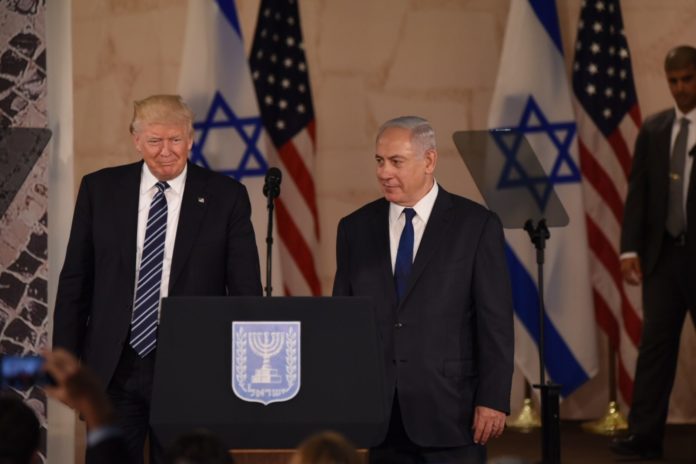Trump Expected to Leave Embassy in Tel Aviv For Now
Sources close to the White House predict that the president will sign a controversial waiver to keep the embassy on Hayarkon Street in Tel Aviv for another six months despite calls by many of his supporters for relocation.
Sources close to the administration said the president is likely to sign the waiver, but they added that the White House has asked them to “remain patient.” Republican activist and Alon Shvut resident Ruth Jaffe-Lieberman wrote on Facebook that she had confirmed with the White House at the beginning of the week that the waiver would be signed along with the request that “we remain patient” and added that she expects the move to occur by the fall.
Laurie Cardoza-Moore, president of the Proclaiming Justice to the Nations group and special United Nations envoy for the World Council of Independent Christian Churches, which represents 40 million evangelical Christians worldwide, said that the Jewish holiday of Shavuot, celebrated in Israel on Wednesday and abroad on Wednesday and Thursday, presented an appropriate time for the move.
“As Jews worldwide celebrate receiving the Torah on Mount Sinai, the leader of the free world is faced with a mission of biblical proportions. Millions of proud American patriots and evangelical Christian Zionists are praying that God gives President Trump the courage to begin the process of moving the U.S. embassy to Jerusalem – the eternal, undivided biblical capital of the reborn State of Israel. It was the Lord of Hosts that chose the people of Israel and Jerusalem as His capital and it is the American people’s biblical responsibility to honor His wish. Having the U.S. embassy in Jerusalem will only bring immense blessing on the peoples of Israel and the United States of America,” Cardoza-Moore said in a statement.
If Trump signs the waiver, he will become the fourth consecutive president to block the implementation of the 1995 Jerusalem Embassy Act. The law specifies that the American embassy in Israel should be located in Jerusalem, but provides the executive branch with the prerogative of delaying the move for six months should the president determine that the move would damage US “national security interests.” Presidents Bill Clinton, George W. Bush, and Barack Obama all pledged to move the embassy to Jerusalem, but routinely blocked the move.
The status of Jerusalem has been a signature issue for Trump since he emerged as the front runner for the Republican nomination in early 2016. In contrast to his predecessors, Trump’s pledge about the embassy to last year’s annual AIPAC policy conference included a reference to the city as the “eternal capital of the Jewish people.” More recently, Trump last month became the first sitting US president to visit the Western Wall, a move condemned by some Palestinians as “recognition of Israel’s sovereignty” over the holy site.
For that reason, Trump supporters appear to view the embassy issue as an important one, but not the only one that indicates the president’s approach to Jerusalem as the capital of Israel. In recent months, sources close to the administration have told TPS that the president was prepared to move the embassy as his first act after taking office, but delayed the move following pressure from Israeli officials. Palestinian officials, including Palestinian Authority Chairman Abu Mazen and chief negotiator Saeb Erekat, both warned that moving the embassy would “end the peace process,” while Hamas warned of an outbreak of violence if the embassy were to be moved.
Prime Minister Binyamin Netanyahu took the reports seriously enough to hold security briefings on the issue during the days before Trump’s inauguration.
Housing and Construction Minister Yoav Galant (Kulanu) told Army Radio on Thursday that moving the embassy would be a welcome and important gesture, but not a critical one.
“Trump is a supportive president and he has taken some steps as president that were very important to the State of Israel,” Galant said. “After eight years of President Obama and Secretary of State Kerry, who embraced Iran and pushed away moderate Sunni forces, which worked against both American and Israeli interests, Trump came in and restored things during his first 100 days in office to the way they should be – an American alliance with moderate Sunni states, pushing away ISIS, al-Qaeda, Iran, Hezbollah, and others.”
“So yes, symbolic gestures are important, but when King David established his kingdom, there was no stamp of approval from President Trump,” Galant added. “And yet, we have always prayed in Jerusalem and towards Jerusalem, our eternal capital.”
“We’ve waited 69 years, we can wait 70,” Galant concluded.






